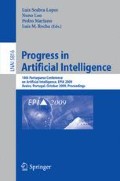Abstract
Diplomacy is a 7-player game that requires coordination between players in order to achieve victory. Its huge search space makes existing search algorithms useless. In this paper we present Darkblade, a player designed as a Multi-Agent System that uses potential fields to calculate moves and evaluate board positions. We tested our player against other recent players. Although there are some limitations, the results are promising.
Access this chapter
Tax calculation will be finalised at checkout
Purchases are for personal use only
Preview
Unable to display preview. Download preview PDF.
References
Schaeffer, J., Burch, N., Björnsson, Y., Kishimoto, A., Müller, M., Lake, R., Lu, P., Sutphen, S.: Checkers is solved. Science 317(5844), 1518–1522 (2007)
Loeb, D.E.: Stable winning coalitions. In: Nowakowski, R.J. (ed.) Games of No Chance, Cambridge, pp. 451–471 (1996)
Duffy, J., Feltovich, N.: Do actions speak louder than words? An experimental comparison of observation and cheap talk. Games and Economic Behaviour 39, 1–27 (2002)
Kraus, S., Lehmann, D.: Designing and building a negotiating automated agent. Computational Intelligence 11(1), 132–171 (1995)
Loeb, D.E.: Challenges in multi-player gaming by computers: A treatise on the diplomacy programming project (1995), http://www.diplom.org/Zine/S1995M/Loeb/Project.html
Hill, A.: The rules of diplomacy, http://www.wizards.com/default.asp?x=ah/prod/diplomacy
Kraus, S., Lehmann, D.: Diplomat, an agent in a multi agent environment: An overview. In: Proceedings of Seventh Annual International Phoenix Conference on Computers and Communications, 1988, pp. 434–438 (1988)
Håård, F.: Multi-agent diplomacy: Tactical planning using cooperative distributed problem solving. Master’s thesis, Blekinge Institute of Technology (2004)
Shapiro, A., Fuchs, G., Levinson, R.: Learning a game strategy using pattern-weights and self-play. In: Schaeffer, J., Müller, M., Björnsson, Y. (eds.) CG 2002. LNCS, vol. 2883, pp. 42–60. Springer, Heidelberg (2003)
Webb, A., Chin, J., Wilkins, T., Payce, J., Dedoyard, V.: Automated negotiation in the game of diplomacy (2008), http://www.doc.ic.ac.uk/project/2007/362/g0736203/TheDiplominator/
Norman, D.: David’s diplomacy ai page, http://www.ellought.demon.co.uk/dipai/ (last checked, March 2008)
Kraus, S.: Negotiation and cooperation in multi-agent environments. Artificial Intelligence 94(1-2), 79–97 (1997)
McCrae, R.R., John, O.P.: An introduction to the five-factor model and its applications. Journal of Personality 60(2), 175–215 (1992)
Talman, S.: The adaptive multi-personality agent. Master’s thesis, Bar Ilan University, Ramat Gan, Israel (2004)
Bonabeau, E., Dorigo, M., Theraulaz, G.: Swarm Intelligence: From Natural to Artificial Systems. Santa Fe Institute Studies in the Sciences of Complexity. Oxford University Press, Oxford (1999)
Ribeiro, J.: Darkblade - an artificial inteligent agent for diplomacy. Master’s thesis, University of Aveiro (2008)
Shaheed, J.: Creating a diplomat. Master’s thesis, Imperial College, UK (2004)
Windsor, P.D.: Geography is destiny, how the standard map dictates fortunes and strategies (1999), http://devel.diplom.org/Zine/F1999R/Windsor/dipmap.html
Author information
Authors and Affiliations
Editor information
Editors and Affiliations
Rights and permissions
Copyright information
© 2009 Springer-Verlag Berlin Heidelberg
About this paper
Cite this paper
Ribeiro, J., Mariano, P., Seabra Lopes, L. (2009). DarkBlade: A Program That Plays Diplomacy. In: Lopes, L.S., Lau, N., Mariano, P., Rocha, L.M. (eds) Progress in Artificial Intelligence. EPIA 2009. Lecture Notes in Computer Science(), vol 5816. Springer, Berlin, Heidelberg. https://doi.org/10.1007/978-3-642-04686-5_40
Download citation
DOI: https://doi.org/10.1007/978-3-642-04686-5_40
Publisher Name: Springer, Berlin, Heidelberg
Print ISBN: 978-3-642-04685-8
Online ISBN: 978-3-642-04686-5
eBook Packages: Computer ScienceComputer Science (R0)

